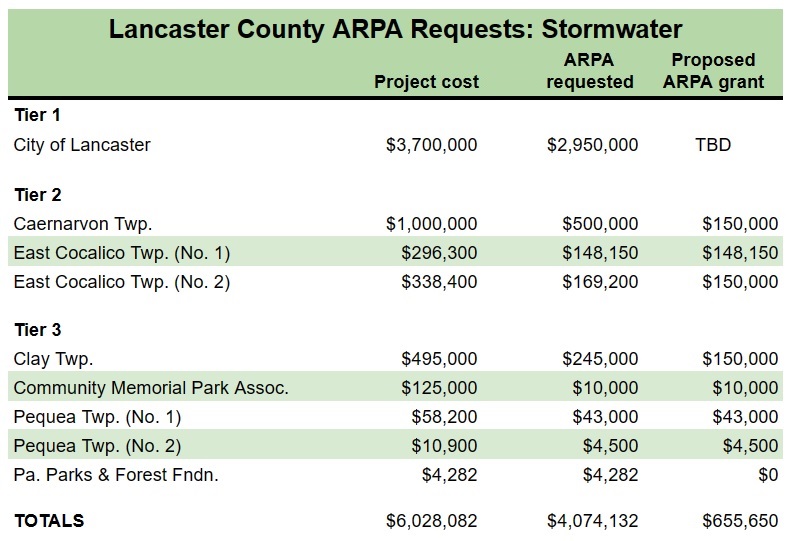Update (Dec. 21): At their meeting Wednesday morning, the county commissioners unanimously approved allocating ARPA funds to the municipal infrastructure projects discussed Tuesday.
Commissioner John Trescot said the board will discuss Lancaster city’s Water Street corridor stormwater project next week.
Previously reported:
The Lancaster County commissioners are set to vote Wednesday morning on providing nearly $7.3 million in American Rescue Plan Act funds for a collection of water, sewer and stormwater projects.
They are a subset of the slate of infrastructure applications that the commissioners reviewed last week. In all, municipalities’ infrastructure-related ARPA requests totaled nearly $17 million for water and sewer and more than $4 million for stormwater.
The allocations up for approval Wednesday are based on a proposal by Commissioner Ray D’Agostino, which he laid out for his colleagues at Tuesday’s work session.
His proposal follows the framework of the county’s Planning Department, which analyzed the projects and divided them into high, medium and low priority tiers.
For Tier 1 water and sewer projects, D’Agostino proposed providing up to 50% of the estimated cost, with a cap of $1 million; or the amount requested, whichever is less. For Tier 2, he proposed the same, but with a cap of 33% of project cost.
He proposed no funding for Tier 3, which consists of maintenance and upgrade projects. The commissioners have said all along that they are reluctant to fund such requests, and that they should instead be covered by organizations’ operational revenue.
Commissioner John Trescot came up with a framework as well. It called for boosting D’Agostino’s proposed $1 million allocations by another $250,000 apiece and for spending somewhat less on Lititz’ project.
For Tier 2, he proposed $90,000 for Ephrata, rather than $127,123; and $300,000 for the Marietta-Donegal Joint Authority, rather than $349,650.
In all, Trescot’s plan called for distributing just over $7 million, versus D’Agostino’s $6.6 million. The difference was small enough that Trescot said he’s willing to vote for D’Agostino’s version.
As for stormwater, Trescot expressed some frustration that the category was back in play: At last week’s work session, the commissioners’ discussion had suggested they were all willing to table those requests for the time being. D’Agostino, however, said that on reflection, he felt the requests were modest enough to make it worth considering them now. He proposed fulfilling them up to a maximum of $150,000.
That’s fine for the Tier 2 and Tier 3 stormwater projects, Trescot said, but not for the sole Tier 1 entry: Lancaster city’s $3.7 million Water Street corridor project to divert stormwater from the city’s combined sewer system. Given the regional impact of the pollution reductions it will lead to, it deserves more support, he said.
After discussion, the commissioners agreed to table that allocation for further discussion. At Commissioner Josh Parsons’ behest, they agreed to reject a $4,282 request from the Pennsylvania Parks & Forest Foundation, which would have funded educational materials for Susquehannock State Park. It’s a small request, but it’s a fundamentally inappropriate use of ARPA dollars, Parsons said.
Pulling those two items from those to be considered Wednesday leaves seven stormwater projects, which would receive $655,650 in ARPA funding under D’Agostino’s proposal.








